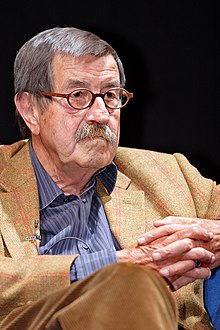Günter Grass
Günter Wilhelm Grass (16 October 1927 in Danzig (now Gdańsk, Poland) – 13 April 2015 in Lübeck[1]) was a German writer and winner of the Nobel Prize in Literature. He was known for writing the controversial, but yet classic novel The Tin Drum.
Günter Grass | |
|---|---|
 Günter Grass in 2006 | |
| Born | 16 October 1927 Danzig-Langfuhr, Free City of Danzig |
| Died | 13 April 2015 (aged 87) Lübeck, Germany |
| Occupation | Novelist, poet, playwright, essayist, sculptor, graphic designer |
| Nationality | German |
| Period | 1956–2015 |
| Literary movement | Vergangenheitsbewältigung |
| Notable works | Die Blechtrommel Katz und Maus Hundejahre Im Krebsgang "Was gesagt werden muss" |
| Notable awards | Georg Büchner Prize 1965 Honorary Fellow of the Royal Society of Literature 1993 Nobel Prize in Literature 1999 Prince of Asturias Awards 1999 |
| Signature |  |
Life
changeGrass was born in Danzig in 1927 and went to school there. In the World War II he had to serve in the military, afterwards he was a prisoner of war of the U.S. army. In 1945 and 1946 he worked as a stonemason. During the rise of Nazi Germany, Grass drafted into the Waffen-SS, the elite armed wing of the Nazi Party.[2] He revealed this in 2006.[2] He said if he had joined the armed wing when he was older, he would have faced war crimes.[2]
From 1946 he studied arts at the Kunstakademie Düsseldorf and the Berlin University of the Arts (Universität der Künste) in West Berlin. He was a member of the German group of writers known as group 47.
He has lived in North Rhine-Westphalia, Berlin and Schleswig-Holstein. He lived in Lübeck. In 1959 he published The Tin Drum (Die Blechtrommel), his most famous work. Grass was always interested in politics and helped in the election campaigns of the SPD. He was a friend of Willy Brandt. Grass was awarded the Nobel Prize in 1999.
Grass died from a lung infection at his home in Lübeck, aged 87.[3]
Bibliography
change- Danziger Trilogie
- Die Blechtrommel (Tin Drum) (1959)
- Katz und Maus (Cat and Mouse)(1961)
- Hundejahre (Dog Years)(1963)
- Örtlich betäubt (Local Anaesthetic) (1969)
- Aus dem Tagebuch einer Schnecke (From the Diary of a Snail) (1972)
- Der Butt (1979)
- Das Treffen in Telgte (1979)
- Kopfgeburten oder Die Deutschen sterben aus (1980)
- Die Rättin (1986)
- Zunge zeigen. Ein Tagebuch in Zeichnungen (1988)
- Unkenrufe (1992)
- Ein weites Feld (1995)
- Mein Jahrhundert (1999)
- Im Krebsgang (2002)
- Letzte Tänze (2003)
English Translations
change- The Danzig Trilogy
- The Tin Drum (1959)
- Cat and Mouse (1963)
- Dog Years (1965)
- Four Plays (1967)
- Speak out! Speeches, Open Letters, Commentaries (1969)
- Local Anaesthetic (1970)
- From the Diary of a Snail (1973)
- In the Egg and Other Poems (1977)
- The Meeting at Telgte (1981)
- The Flounder (1978)
- Headbirths, or, the Germans are Dying Out (1982)
- The Rat (1987)
- Show Your Tongue (1987)
- Two States One Nation? (1990)
- The Call of the Toad (1992)
- The Plebeians Rehearse the Uprising (1996)
- My Century (1999)
- Too Far Afield (2000)
- Crabwalk (2002)
References
change- ↑ "Günter Grass im Alter von 87 Jahren gestorben". Faz.net (in German). 2015-04-13. Retrieved 2015-04-13.
- ↑ 2.0 2.1 2.2 "Günter Grass: From the Nazi Waffen-SS to the Nobel prize for literature". IBTimes.com. 13 April 2015. Retrieved August 5, 2015.
- ↑ "Renowned German author Günter Grass dies, aged 87". DW.de. Retrieved April 14, 2015.
Other websites
change- Nobel prize biographical notes Archived 2006-04-29 at the Wayback Machine (in English, also available in French, German, and Swedish)
- Nobel Laureate Flays Bush, June 1, 2006 Archived April 7, 2011, at the Wayback Machine